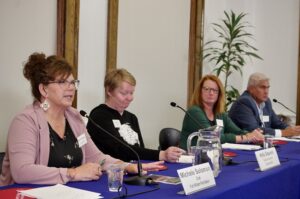Local Thunder Bay leadership explore community safety conversations

By Rick Garrick
THUNDER BAY — Fort William Chief Michele Solomon recently participated in the Thunder Bay Public Library’s Community Conversations panel discussion, How do we make our city safe?, on Oct. 3 at the Brodie Library. Elevate Northwest executive director Holly Gauvin, Canadian Mental Health Association CEO Jennifer Hyslop, and Thunder Bay Police Chief Darcy Fleury also participated on the panel.
“It went really well — I think it was a great first community conversation,” Chief Solomon says. “I would love to see it continue, I would definitely like to see other Indigenous organizations be involved and represented so that we’re having a really fulsome conversation. If there was one message I wanted to leave here tonight it was you have to talk to the people who are experiencing the systemic racism and the discrimination, those are people we really need to be talking to.”
The first question for the Community Conversations panel was: What does public safety mean to you?
“When I think of public safety, I think of the opportunity for all members of the society to feel safe in their community and that there’s safe spaces for everybody to be,” Chief Solomon says. “I think that sometimes the idea is out there that it’s, what I would consider, the most vulnerable that make our city unsafe when in fact those folks are probably the most unsafe in the community, so it really means having a safe place for all of Thunder Bay public.”
Gauvin says public safety means an environment or a city that is free of things like stigma, racism, sexism, genderism, ableism, healthism, and misogyny.
“All of these things give people licence to treat people with less dignity, less respect, and make those people feel as if they are less than and less deserving, and that just isn’t OK,” Gauvin says. “It also gives people licence to do harm to others and all you have to do is consider the recent state of emergency with respect to domestic violence as evidence of that, so when I think of a safe community, that’s what I think of is that these things are just not present.”
Hyslop says she echoes what Solomon and Gauvin said about public safety.
“It really is about safe spaces for everybody in our community, the marginalized and those of us who live without facing that,” Hyslop says. “It’s well-being, it’s how we respond to emergencies like domestic violence, like the outcomes of racism and the violence.”
Fleury says one of the issues raised in Thunder Bay’s 2022 Citizen Satisfaction Survey identifies that less than 30 per cent of people strongly agree that they feel safe letting their children play outside in their neighbourhood, is a real call for the police to pay attention to.
“When we’re talking about a safe community, it is that sense, it’s how you feel about going into your community, how you feel about going to the stores, how you feel about shopping locally and really the sense you have not only for yourself but also for the others,” Fleury says. “There are a lot of people in this community that are in bad ways but there’s also a lot of people in this community that are taking advantage of those people, so safety also has to come from addressing those, [an] all-around full global picture of where the harm is, who’s conducting that harm on the enforcement side for us and how we engage those people and work towards getting those people who are in a bad way to a healthier lifestyle and addressing those people who are keeping them in that lifestyle.”
A video of the Community Conversations panel discussion is posted online on the Thunder Bay Public Library’s YouTube page.

